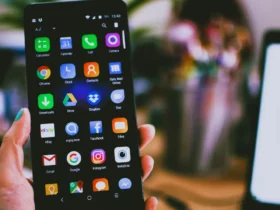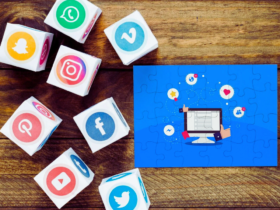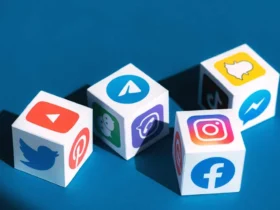What started as a platform for connecting friends and sharing personal moments has evolved into a powerful tool for business, politics, entertainment, and social movements. Today, millions of people across the globe use social media not just to stay in touch with loved ones but also to engage in debates, discover trends, and consume content. In a world where time and distance no longer limit communication, social media has emerged as a driving force behind much of the change we experience today, both at an individual and societal level.
As social media continues to evolve, it plays an increasingly influential role in shaping public opinion, driving consumer behavior, and even affecting global politics. Social platforms have become essential spaces for businesses to engage with their audience, for influencers to gain massive followings, and for individuals to voice their opinions. From Instagram’s visual storytelling to Twitter’s rapid dissemination of news, social media trends not only reflect but also shape cultural, social, and political climates. In this article, we’ll dive into the impact of social media on communication, its influence on different sectors, and the trends that are shaping its future.
The Impact of Social Media
Social media has evolved far beyond its initial role as a simple tool for connecting friends and family. Today, it is an indispensable part of daily life, influencing everything from personal relationships to business strategies and political campaigns. The advent of social platforms like Facebook, Instagram, Twitter, TikTok, and LinkedIn has dramatically altered how people communicate and interact, not just with their networks, but with brands, celebrities, and even political leaders. The core impact of social media lies in its ability to break down geographical and societal barriers, enabling instant communication and information exchange across the globe. This has made social media a powerful tool for businesses, politicians, influencers, and activists. Businesses use these platforms to reach vast audiences with targeted advertisements, customer service, and influencer partnerships.
Politicians rely on social media to engage with voters, share policies, and create public discourse. Activists use it to mobilize support, raise awareness, and organize movements that can influence public opinion and policy changes. Social media has also changed the way individuals consume content. Traditional forms of media like television, radio, and print are no longer the primary sources of information for many. Instead, platforms like YouTube, Twitter, and TikTok have become hubs for real-time news, entertainment, and even education. These platforms have empowered people to create and share content, turning ordinary users into influencers and content creators.
Key Social Media Platforms and Their Impact
Each platform caters to distinct needs, from personal networking to professional branding, and plays a crucial role in shaping the way individuals and businesses communicate, consume content, and engage with the world.
| Platform | User Base | Main Use | Impact on Society |
| 2.96 billion | Social Networking | Changed how people stay in touch, and how businesses market products. | |
| 2.35 billion | Photo and Video Sharing | Impacted influencer culture and visual marketing strategies. | |
| 400 million | Microblogging | Became a hub for real-time news, political debates, and trending topics. | |
| TikTok | 1.1 billion | Short-Form Videos | Redefined video consumption, trends, and entertainment. |
| 900 million | Professional Networking | Altered job searching, recruitment, and professional branding. |
The Influence of Social Media on Communication
No longer limited to face-to-face conversations or traditional communication channels, individuals can now broadcast their thoughts, opinions, and content to a global audience with just a few clicks. This level of accessibility has led to the rise of new forms of interaction, such as viral trends, hashtag movements, and global conversations that transcend national borders and cultural differences. One of the most notable changes in communication brought about by social media is the emergence of the “micro-celebrity.
These are individuals who, through consistent online presence and engagement, can rise to fame and influence. The concept of fame has shifted from being confined to traditional celebrities to ordinary people who leverage social media to build significant followings. Influencers, whether they are well-known figures or everyday individuals, now play an important role in shaping public opinion, guiding consumer behavior, and setting cultural trends.
Social media has also created a platform for raising awareness about important social issues and causes. Activists can use these platforms to quickly spread messages, mobilize support, and initiate movements that can have a profound effect on public discourse. From promoting environmental sustainability to advocating for human rights, social media empowers people to initiate change and amplify their voices in ways that were previously impossible.
How Social Media Influences Different Sectors
From businesses engaging with customers directly to activists promoting causes, the impact of social media on communication is immense. It has democratized the flow of information, giving everyone a voice and the opportunity to engage with a global audience. Social media is not only reshaping how we communicate but also how industries, politicians, entertainers, and activists interact with the world.
| Sector | Influence | Example |
| Business | Businesses may communicate directly with their customers thanks to social media. | Brands use Instagram and Twitter to launch campaigns and promotions, driving consumer interest. |
| Politics | Political figures use social media for campaigning, spreading agendas, and connecting with voters. | Twitter serves as a platform for real-time political discourse and debates, including presidential campaigns. |
| Entertainment | Influencers, actors, and singers may communicate with their audience on social media. | TikTok challenges, viral trends, and songs reshape music and entertainment consumption patterns. |
| Social Movements | Activists utilize platforms to organize, raise awareness, and mobilize individuals for a cause. | Movements like #BlackLivesMatter gained momentum and visibility worldwide through Twitter and Instagram. |
| Education | Social media encourages online learning, community learning, and teamwork. | LinkedIn and other platforms offer professional networking, learning resources, and opportunities for career growth. |
Social Media’s Role in Shaping Modern Culture
Initially designed as a way to stay connected with friends and family, social media platforms have evolved into powerful tools for shaping how we perceive fashion, trends, politics, and even mental health. These platforms have provided a space for individuals to share their experiences, opinions, and creativity with a global audience, thereby influencing cultural norms and societal values. One of the most significant impacts of social media on culture is its ability to create viral trends that can spread across the globe in a matter of hours. Whether it’s a new dance craze on TikTok, a viral hashtag promoting social justice on Twitter, or a meme that captures the collective humor of the moment, social media has revolutionized the speed and scale at which cultural movements occur.
This instantaneous nature of social media allows trends to evolve quickly, and it has made it possible for people to be part of global conversations from virtually anywhere in the world. Furthermore, social media has played a crucial role in reshaping the concept of fame and relevance. In the past, gaining fame required traditional routes such as television, movies, or music albums. Platforms like YouTube, Instagram, and TikTok have democratized entertainment, allowing people to create content, share it, and potentially gain fame without needing the backing of a major production company or network.
The rise of the “micro-celebrity” and influencer culture has redefined what it means to be popular in today’s world. Social media has also significantly influenced cultural movements and conversations about social justice, mental health, and political change. Platforms like Twitter and Instagram have become essential tools for raising awareness about societal issues, giving people the power to advocate for causes and mobilize others. Whether it’s promoting body positivity, raising awareness about climate change, or highlighting mental health struggles, social media has given a voice to individuals who might otherwise have been overlooked.
Trends in Social Media: What’s Next?
As social media continues to evolve, it’s essential to stay aware of the trends that will shape its future. The social media ecosystem is always evolving due to factors including user behavior changes and technical improvements. The following trends highlight the direction that social media is headed in the coming years:
Short-Form Video Content
One of the most significant trends in social media today is the growing popularity of short-form video content. These videos, typically lasting from a few seconds to a couple of minutes, are perfect for today’s fast-paced, on-the-go users. As people continue to crave bite-sized entertainment, short-form video content is expected to remain a dominant format on social media. Other platforms, like Instagram Reels and YouTube Shorts, have also embraced this trend, allowing users to create and discover quick, captivating content.
Augmented Reality (AR)
Augmented Reality (AR) is another trend that is expected to grow in the coming years. This could lead to new possibilities for content creation, virtual shopping experiences, and even virtual meetings or events. With AR, social media will offer new ways for users to interact with their environment and with each other in more dynamic and personalized ways.
Social Commerce
like Instagram, Facebook, and Pinterest have introduced shopping features that allow users to purchase products directly through the app. This trend blurs the lines between content and commerce, enabling brands to market their products seamlessly within the social media experience. Social commerce is expected to continue growing as platforms develop more tools for businesses to engage with consumers and provide a smoother, more integrated shopping experience.
AI-Powered Content
Artificial Intelligence (AI) is becoming an integral part of social media, helping to power content creation and curation. Algorithms are now suggesting what content to watch, read, or buy based on individual user preferences and behaviors. This AI-driven content discovery not only makes the user experience more personalized but also helps creators and brands reach their target audiences more effectively.
Privacy and Security
With the increasing concerns around data privacy, social media platforms are expected to place more emphasis on protecting user information and ensuring transparency in how data is used. Privacy regulations such as the General Data Protection Regulation (GDPR) have already pushed platforms to implement stricter privacy policies. As awareness of data breaches and online security threats grows, users will demand more control over their data. Social media platforms will likely respond by offering more granular privacy settings, encryption features, and transparent data management policies to maintain user trust.
Social media’s effects on wellbeing and mental health
While it can serve as a source of connection and entertainment, the constant stream of content and the pressure to maintain an idealized online persona can have negative consequences, particularly on mental well-being. For many users, especially young people, social media can contribute to feelings of anxiety, depression, and stress. The pressure to curate a perfect online image or the constant comparison to others’ seemingly perfect lives can lead to feelings of inadequacy and lower self-esteem. Studies have shown that excessive social media use is often associated with poor body image, especially among adolescents who are exposed to highly edited and unrealistic portrayals of beauty. This can contribute to unhealthy standards of self-worth and body image, triggering mental health issues like eating disorders or depression.
Users might experience anxiety when they don’t measure up to the curated lives of influencers or celebrities. Additionally, the addictive nature of social media platforms can lead to prolonged usage, reducing face-to-face interactions and increasing feelings of loneliness or isolation. On the other hand, social media also has a positive side when it comes to mental health. Many people who feel isolated or misunderstood in their immediate social circles have turned to social media for comfort and empowerment. Mental health advocates use platforms like Instagram, Twitter, and YouTube to share personal stories, offer coping strategies, and reduce the stigma surrounding mental health issues.
Moreover, there are an increasing number of apps and platforms designed specifically to promote mental well-being, offering everything from meditation and mindfulness exercises to therapy and counseling services. These platforms make mental health resources more accessible, helping users take proactive steps to maintain their emotional and psychological health. while social media has the potential to contribute to mental health challenges, it also offers significant opportunities for support, awareness, and empowerment. The key is finding balance and using social platforms in a way that promotes well-being rather than exacerbates feelings of inadequacy or anxiety.
wrapping up
It has created new opportunities for connection and business while also presenting challenges, particularly in terms of mental health, privacy, and the spread of misinformation. The impact of social media is undeniable — from the rise of influencers and the democratization of entertainment to the way social movements gain momentum. As we move forward, the trends in social media, such as short-form videos, augmented reality, and social commerce, will continue to evolve and redefine the digital landscape.
Social media will remain a driving force in shaping culture, communication, and commerce for years to come. The key is to harness its potential while addressing the challenges it presents, ensuring a healthier and more sustainable digital future for all.
FAQs
How has social media influenced businesses?
Social media has dramatically transformed how businesses interact with their customers and market their products. Platforms like Facebook, Instagram, and LinkedIn allow companies to engage directly with their audience, promote their products, and build brand recognition. Through targeted ads and user-generated content, businesses can reach a vast and diverse audience. Moreover, social media has enabled businesses to track customer behavior, optimize marketing strategies, and build more personalized relationships, all while fostering brand loyalty through consistent engagement.
What part do social media marketing influencers play?
Influencers are individuals who have garnered a significant following on social media platforms and can sway their followers’ opinions, especially when it comes to purchasing decisions. They can have a direct impact on brand perception and drive sales by promoting products to a niche, yet engaged, audience. Many brands partner with influencers for sponsored content, which often feels more authentic and relatable to consumers. This trend has led to influencer marketing becoming one of the most powerful strategies in modern advertising, as influencers provide credibility and trust that traditional advertising cannot.
Can social media be harmful to mental health?
Prolonged exposure to social media can negatively affect mental health in several ways. For many users, especially young people, social media can foster feelings of inadequacy, anxiety, and depression. The constant comparison to others’ seemingly perfect lives and the pressure to conform to idealized beauty or success standards can contribute to low self-esteem. However, social media is not inherently harmful. When used mindfully, it can also serve as a source of support and empowerment, providing access to communities focused on mental health, self-care tips, and positive reinforcement.
Which social media trends are the most popular at the moment?
Some of the biggest trends currently shaping the social media landscape include short-form video content, which has seen massive growth through platforms like TikTok and Instagram Reels. Augmented reality (AR) is also becoming increasingly popular, with apps like Instagram and Snapchat using AR filters to engage users. Another growing trend is social commerce, where platforms like Instagram and Facebook allow users to shop directly through posts and ads. Finally, privacy concerns are prompting social media platforms to adopt more privacy-focused features, giving users greater control over their data and how it’s shared.
How do social media platforms impact social movements?
Social media platforms have become powerful tools for social movements, allowing activists to raise awareness, organize events, and mobilize support. Hashtags like #BlackLivesMatter, #MeToo, and #ClimateStrike have gained global traction through social media, helping to amplify voices that may otherwise be marginalized. These platforms enable real-time communication and coordination, giving movements the ability to spread rapidly and reach a large, diverse audience. Social media has also helped foster a sense of solidarity among people who share common values, creating a digital community of activists who can influence change on a global scale.
How do social media algorithms work?
Social media algorithms are designed to personalize users’ experiences by prioritizing content that is most likely to interest them, based on their past interactions. These algorithms analyze behaviors like likes, comments, shares, and time spent on particular posts to predict what users will engage with next. Platforms like Facebook, Instagram, and YouTube use these algorithms to keep users on the platform longer, displaying content that is not only relevant but also highly engaging. As a result, algorithms help users discover new content but can also create filter bubbles, limiting exposure to diverse viewpoints.
How can social media platforms address privacy concerns?
Social media platforms can address privacy concerns by adopting stricter data protection measures and being transparent about how they collect and use personal data. Allowing users to have more control over their information, such as providing easy-to-access privacy settings, is essential in building trust. Platforms must also comply with global privacy laws like the GDPR (General Data Protection Regulation), ensuring that users’ data is handled securely and that their consent is obtained for data collection. Additionally, regular audits, clear privacy policies, and proactive notifications about changes in data practices will help improve transparency and accountability.





